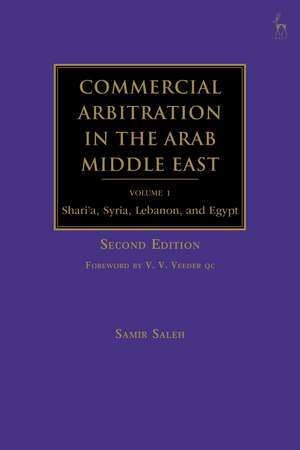Commercial Arbitration in the Arab Middle East: Shari'a, Syria, Lebanon, and Egypt
Autor Samir A. Saleh Cuvânt înainte de V. V. Veeder, QCen Limba Engleză Hardback – 11 ian 2006
Preț: 1918.93 lei
Preț vechi: 2639.28 lei
-27% Nou
Puncte Express: 2878
Preț estimativ în valută:
367.24€ • 379.37$ • 305.63£
367.24€ • 379.37$ • 305.63£
Carte tipărită la comandă
Livrare economică 25 martie-08 aprilie
Preluare comenzi: 021 569.72.76
Specificații
ISBN-13: 9781841134444
ISBN-10: 1841134449
Pagini: 507
Dimensiuni: 156 x 234 x 39 mm
Greutate: 0.82 kg
Ediția:Revised
Editura: Bloomsbury Publishing
Colecția Hart Publishing
Locul publicării:London, United Kingdom
ISBN-10: 1841134449
Pagini: 507
Dimensiuni: 156 x 234 x 39 mm
Greutate: 0.82 kg
Ediția:Revised
Editura: Bloomsbury Publishing
Colecția Hart Publishing
Locul publicării:London, United Kingdom
Caracteristici
Following the success of the first edition,the author has completely revised and up-dated all parts of the book so that it offers a fully modern account of domestic commercial arbitration practice in the Middle East.
Notă biografică
Samir Saleh, Attorney at Law, is a Legal Consultant in Islamic and Middle Eastern Law, based in London. A Member of the LCIA, he is regularly appointed to arbitrations by the ICC International Court of Arbitration.
Cuprins
1 Sharia I. Role of Sharia in general, role of Sharia in Arab constitutions, role of Sharia in commercial arbitration II. Main Sharia schools III. Sharia general sources, arbitration sources and geographical scope IV. Definition and features of arbitration in Sharia V. Capacity of parties to enter into arbitration agreements, incapacitated persons, legal entities, non-Muslim parties VI. Qualifications of arbitratorsVII. The appointment, remuneration and termination of the office of arbitrator VIII. Arbitrable disputes, arbitration clauses, arbitration agreements IX. Number of arbitrators, applicable substantive and procedural laws, arbitration proceedings X. Rules of evidence and the basic principles of fair trial in Sharia XI. The concept of foreign element under sharia, arbitration clauses and arbitration agreements with foreign elements, enforcement of foreign awards XII. Qadi's intervention, the award, binding and enforceable effects, methods of judicial review 2 SyriaIntroduction-Professor Antoine Kassis Part I: Domestic Law I. Law of arbitration, sources, main influence, features II. Institutional arbitration and practice III. Arbitrators' qualifications, appointment, remuneration, disqualification, challenge, liability, termination of office IV. Arbitrability of disputes V. Capacity of parties VI. Arbitration clauses and arbitration agreements VII. Effect of arbitration clauses and arbitration agreements (compromis)VIII. Types of arbitration, applicable law, arbitral proceedings IX. Court intervention X. The award XI. Methods of judicial review XII. Exequatur of domestic awards Part II: International Aspects I. Definition and features II. International arbitration: the Syrian outlook III. The recognition of international arbitration IV. The doctrinal controversy over the recognition of the NewYork Convention of 10 June 1958 V. Exequatur of foreign awards VI. The Conseil d'Etat's over-extended jurisdiction overdomestic and foreign awards and its interpretation ofarticle 44 of Legislative Decree No 55 of 1959 VII. International and inter-Arab treaties and conventionspertaining to the enforcement of arbitral awards 3 LebanonIntroduction - Professor Sélim Jahel Part I: Domestic Law The domestic law section for the Lebanon follows the same structure as that for Syria (see above)Part II: International Aspects I. Definition of international arbitration II. Arbitrator's qualification, nationality, appointment, remuneration, disqualification, replacement, termination of office III. Arbitrability of dispute IV. Capacity, authority V. Arbitration agreements VI. Effect of arbitration agreements VII. Types of arbitration, applicable law and procedure VIII. Court intervention IX. The award X. Action for setting aside international and foreign awards XI. Recognition and enforcement of international and foreign awards XII. Methods of judicial review against decisions for recognition and/or exequatur of international and foreign awards XIII. International and inter-Arab treaties and conventions pertaining to the recognition and exequatur of arbitral awards. 4 EgyptIntroduction - Mark Hoyle I. Law of arbitration: sources, general features II. Arbitration institutions and practice III. Law No 27 of 1994: general definitions, scope of application, preliminary and general provisions IV. Arbitrators' capacity and qualifications, appointment, remuneration, disqualification, challenge, liability, termination of office V. Arbitrability of disputes VI. Capacity of parties, authority VII. The arbitration agreement: definition, contents, conditions as to form and substance, effects, interim and conservatory measures, autonomy and severability of arbitration clauses VIII. Types of arbitration, applicable law, arbitral proceedings IX. Court intervention X. The award XI. The action for setting aside XII. Exequatur XIII. International and inter-Arab conventions Glossary of Arabic Terms Bibliography
Descriere
An up-to-date comprehensive account of domestic commercial arbitration practice in the Middle East by an author with intimate knowledge of the region.
